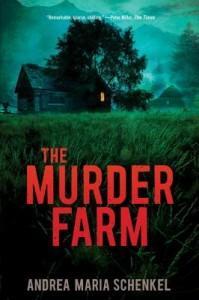Title: The Murder Farm
Author: Andrea Maria Schenkel
ISBN: 978-1623651671
No. of Pages: 208
Genre: Mystery
Origins: Quercus Books
Release Date: 3 June 2014
Bottom Line: Creative and chilling
 Synopsis:
Synopsis:
“The Murder Farm begins with a shock: a whole family has been murdered with a pickaxe. They were old Danner the farmer, an overbearing patriarch; his put-upon devoutly religious wife; and their daughter Barbara Spangler, whose husband Vincenz left her after fathering her daughter little Marianne. She also had a son, two-year-old Josef, the result of her affair with local farmer Georg Hauer after his wife’s death from cancer. Hauer himself claimed paternity. Also murdered was the Danners’ maidservant, Marie.
An unconventional detective story, The Murder Farm is an exciting blend of eyewitness account, third-person narrative, pious diatribes, and incomplete case file that will keep readers guessing. When we leave the narrator, not even he knows the truth, and only the reader is able to reach the shattering conclusion.”
Thoughts: Ms. Schenkel models The Murder Farm as a traditional detective story. In much the same way as detectives must piece together various fragments of evidence to arrive at a provable conclusion, each shift in the narrator unveils another small image of the true happenings on the Danner farm, Similarly, just as said evidence takes multiple forms in real life, the evidence of the Danner farm murders are equally varied. Much of this evidence is not in what each narrator states outright but what is not said. Weeding through the implications of these omissions provides readers with a fascinating glimpse into the isolated lives of the inhabitants of this small German village as well as the emotions involved with such a gruesome crime.
Because of the variety of narrators, the story can only be successful if each narrator has his or her own unique voice. This is just one on the many areas in which Ms. Schenkel succeeds. The Murder Farm never feels like one novel pretending to be separate parts. It really does feel and read like a collection of stories that, when read together, provides a clear intimation of what occurred before, during, and after that fateful day. The voices are separate and distinct, making it fairly simple for acute readers to glean the truth before the big reveal. However, those readers who fail to make the connections miss none of the psychology or emotion of the conclusion, vital to any murder mystery.
The Murder Farm may occur in an isolated area of Germany and have its origins in a real-life murder mystery from said area, but there is a generic quality to it that makes it easy for readers to extrapolate the events into any isolated locale. The time period also may be the 1950s but the story feels timeless. So much so that any direct reference to the year can be quite jarring for readers, pulling them out of the narrative and back into the real world. This ephemeral quality makes it so easy for readers to sink into the horrors without having to worry about specifics like setting.
Short and sweet, The Murder Farm packs a powerful punch in a relatively few pages. Ms. Schenkel establishes the story’s ominous tone from the beginning with the use of eyewitness interviews of past events and makes the story even creepier with the inclusion of first-person narratives of current events. It is so much more than a whodunit novel though, something readers begin to understand as a clear picture of life at the Danner farm forms.
